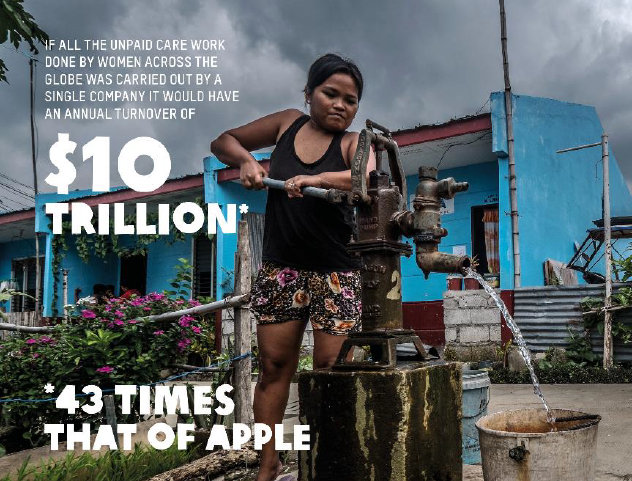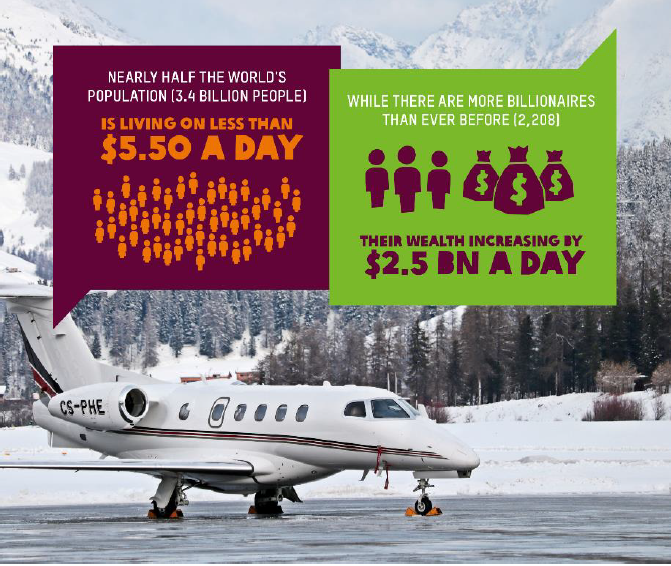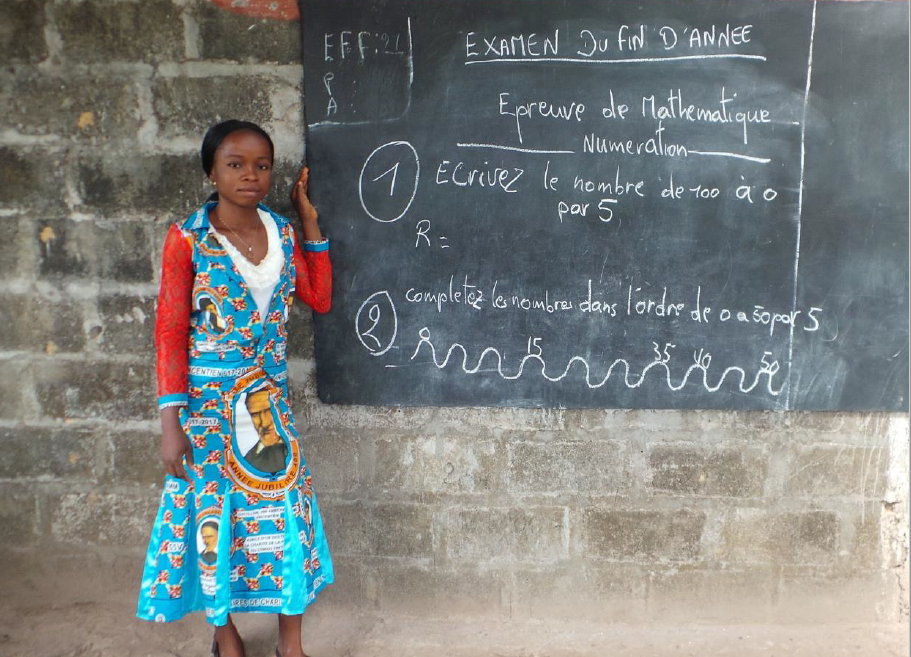 This week, Oxfam released their annual wealth check report, Public Good or Private Wealth?, highlighting the concentration of the world’s wealth. As you have probably already seen in mainstream and social media, the report finds that the 26 richest billionaires on the planet own as many assets as the poorest half of humanity (3.8 billion people).
This week, Oxfam released their annual wealth check report, Public Good or Private Wealth?, highlighting the concentration of the world’s wealth. As you have probably already seen in mainstream and social media, the report finds that the 26 richest billionaires on the planet own as many assets as the poorest half of humanity (3.8 billion people).
Although there has been a very significant decrease in the number of people living in extreme poverty (the exact extent of the decrease is a matter of intense debate), rising inequality is jeopardising any future progress that needs to be made, according to Oxfam’s director of campaigns and policy, Matthew Spencer.
Below, in no particular order, are our top ten takeaway facts from the report which can be used as background research, as a tool to spark debate and discussion in an educational setting, or the basis for an action project in your youth club or school:
- The wealth of the world’s billionaires increased by $900 billion in 2018 – the equivalent of $2bn per day. In the meantime, extreme poverty is increasing in sub-Saharan Africa with the bottom half of humanity barely surviving on less than $5.50 per day
- Men own 50% more of the total wealth in the world than women. During the same period, 16.4 billion hours of unpaid care work will be done, the majority of which is done by women in poverty
- Spending on education and health accounted for 69% of the total reduction of inequality, based on a study of 13 developing countries. If the richest 1% of humanity paid just 0.5% more in taxes, it would be enough to educate all of the 262 million children out of school AND provide enough healthcare to save the lives of 3.3 million people per day
- The World’s richest man, Jeff Bezos, owner of Amazon, saw his fortune increase by $112bn. Just 1% of his fortune is equivalent to the entire health budget of Ethiopia for a whole year, a country with a population of 105 million. Bezos recently said that he has decided to invest his fortune in space travel as he can’t think of anything else to spend it on
- Only 4c from every $1 generated by tax comes from a tax on wealth. In some countries like Brazil and the UK, the poorest 10% of the population are now paying a higher proportion of their income in taxes than the richest 10%
- The super-rich are hiding $7.6 trillion from the tax authorities, a practice also carried out by many large corporations. Together, this deprives developing countries of $170bn per year
- If all of the unpaid care work done by women across the globe was carried out by a single company, it would have an annual turnover of $10 trillion – 43 times that of Apple
- Life expectancy in one of the poorest parts of London is six years less than it is in one of the capital’s richest neighbourhood, a mere few miles away
- Evidence from 137 developing countries shows that a child from a poor family is on average twice a likely to die before their fifth birthday than a child from a rich family
- As recently as 1980, the top rate of personal income tax in the US was 70%. Today it is almost half of that at 37%. The numerous exemptions and loopholes mean the rates that rich people and corporations actually pay are lower still. As a result, in some countries, the richest people are paying lower rates of tax than they have in a century.
Meaningful Action
‘Tax policies have the potential not only to reduce the gap between rich and poor, but also to decrease inequality between women and men. However, the current global tax system, through relying more on taxes like VAT, is shifting the burden to the poorest individuals and households, meaning the majority of those affected are women. This is no coincidence, as it is the poorest women who have least influence over tax decisions and least opportunity to hold government to account.
Without addressing this problem of under-taxation of those most able to pay, the inequality crisis will remain out of control and we will not be able to overcome poverty’
(Public Good or Private Wealth, p24)

According to Oxfam, governments need to listen to ordinary citizens and take meaningful action to reduce inequality. They also need to set concrete, timebound targets and action plans to reduce inequality as part of their commitments under Sustainable Development Goal (SDG) 10 on inequality. These plans should include action in the following three areas:
- Deliver universal free health care, education and other public services that also work for women and girls. Stop supporting privatization of public services. Provide pensions, child benefits and other social protection for all. Design all services to ensure they also deliver for women and girls.
- Free up women’s time by easing the millions of unpaid hours they spend every day caring for their families and homes. Let those who do this essential work have a say in budget decisions and make freeing up women’s time a key objective of government spending. Invest in public services including water, electricity and childcare that reduce the time needed to do this unpaid work. Design all public services in a way that works for those with little time to spare.
- End the under-taxation of rich individuals and corporations. Tax wealth and capital at fairer levels. Stop the race to the bottom on personal income and corporate taxes. Eliminate tax avoidance and evasion by corporates and the super-rich. Agree a new set of global rules and institutions to fundamentally redesign the tax system to make it fair, with developing countries having an equal seat at the table.

